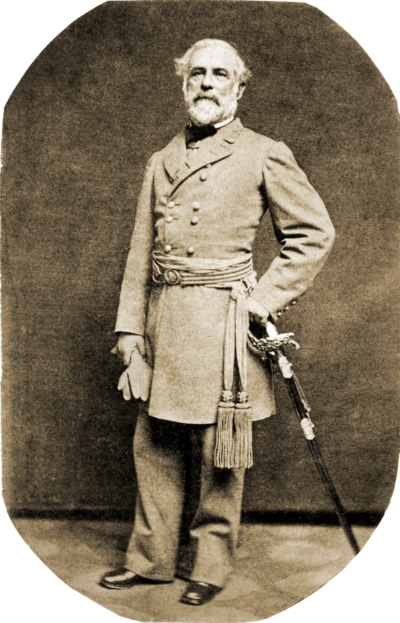The Confederates renewed the battle at Seven Pines on the morning of June 1st. The day before their attacks had been uncoordinated, and D. H. Hill finally attacked before all the troops were in position. The command situation was in turmoil, with Joseph E. Johnston wounded, G. W. Smith in command and Robert E. Lee soon to take over. The Confederate attacks were renewed, but the Federals held strong positions and had been reinforced. Two Union divisions counterattacked, stopping the Confederate advance. The Southerners eventually broke off the battle, retreating at 11:30 am. The North had lost 790 killed, 3,594 wounded and 647 missing, the Confederates 980 killed, 4,749 wounded and 405 missing. Although the attack was unsuccessful, it shook McClellan and he made no attempt to launch a counterattack while the Confederates were still reeling from their defeat.
The most important effect of the battle was the wounding of Johnston and the appointment of Lee to lead the army. The reaction at first was not very positive. "I prefer Lee to Johnston." McClellan said, "The former is too cautious and weak under grave responsibility. Personally brave and energetic to a fault, he yet is wanting in moral firmness when pressed by heavy responsibility, and is likely to be timid and irresolute in action." However, this view soon changed. Looking back one Northern officer wrote:
"The shell ... which wounded ... General Johnston, although it confused the Rebels, was the saddest shot fired during the war. It changed the entire Rebel tactics. It took away incompetence, indecision and satisfaction and gave skillful generalship, excellent plans and good discipline.... Before the battle of Fair Oaks, Rebel troops were sickly, half fed and clothed, and had no hearts for their work. ... [After Lee took command], the troops improved in appearance. ... The discipline became better; they went into battles with shouts, and without being urged, and, when in, fought like tigers. ... A more marked change for the better never was made in any body of men than that wrought in his army by the sensible actions of General Lee."Lee soon won over the hearts of officers and men. This was one of his best qualities. While others, such as Jackson and A. P. Hill, frequently quarreled with their subordinates, Lee was able to work graciously even with those who he would rather not deal with. Even Johnston recognized that the change fo commanders was for the better, saying, "the shot that struck me down was the best every fired for the Confederacy..."




0 comments:
Post a Comment